- Home
- Stephen Hunter
A Bob Lee Swagger eBook Boxed Set: I, Sniper, Night of Thunder, 47th Samurai Page 2
A Bob Lee Swagger eBook Boxed Set: I, Sniper, Night of Thunder, 47th Samurai Read online
Page 2
“There,” said the captain, pointing, and the gunner cranked his windage to the right, the finned barrel revolved on its mesh of gears, and the gun rocked, spent cartridges spilled, the tracer lashed, and in the vapors shapes stumbled and went down amid the stench of sulfur.
“Sir,” someone yelled from the leftmost gun chamber.
Holding his sword so it would not clatter, the captain ran through the connecting tunnel.
“Yes?”
“Sir, Yamaki says he saw men moving off on the left. Just a flash of them moving directly away from our position.” Gun smoke filled the room, thin and acrid, eating at nasal tissues, tearing up eyes.
“Flamethrowers?”
“I couldn’t see, sir.”
Well, it had to be. The American commander wouldn’t move his people directly at the guns. The hairy beasts never did that; they didn’t have the stomach and they weren’t eager to die. They would die if necessary, but they weren’t hungry for it. Glorious death meant nothing to them.
The captain tried to think it out.
He’d either go to his left or right, and you’d think he’d go to his left. There was more cover, the vegetation was thicker, and it was hard to bring direct fire because the ridge was steeper. You were mostly in danger from grenades, but the Americans didn’t fear the Japanese grenades, because they were so underpowered and erratic.
The captain tried to feel his opponent. His imagination of a white man was someone impossibly big and hairy and pink. He conceived of a cowboy or a ghost, but he knew there’d be intelligence guiding it. The Japanese had learned the hard way over the years that the Americans may not have had honor but they had intelligence. They weren’t stupid, they weren’t cowards, and there was an endless supply of them.
It came down to left or right? He knew the answer: the right. He’d go to his right. He’d send the flamethrowers up that way because it was less obvious: there wasn’t much cover, he’d run into spider holes, but he had the skill to overcome the spider holes. It seemed more dangerous, but a smart hand would have the advantage if he knew how to use terrain and was aggressive.
“I’ll take care of it. You men, keep firing. You won’t see whole targets, you’ll see shapes. Fire on shapes. Be samurai!”
“Samurai!”
The captain ran back to the central chamber.
“The little gun,” he ordered. “Quickly.”
A sergeant brought him the submachine gun called the Type 100, an 8 mm weapon whose central design had been stolen from the Germans. It had a wooden stock, a ventilated barrel, and a magazine fitted horizontally to the left from the breech. They were prizes; there were never enough of them to go around. What we could have done with a million of them! We’d be in New York today! The captain had to lobby General Kuribayashi personally to get one assigned to his position.
He threw on a bandolier hung with pouches full of grenades and spare magazines, buckling it tight to his body. Carefully, he disconnected his sword from his belt, laying it aside.
“I want to ambush the flamethrower attack. I’ll intercept them well beyond our lines. Give me covering fire.”
He turned, nodded to a private, who unlatched the heavy steel door at the rear of the blockhouse, and scrambled out.
“What’s your name, son?”
“MacReedy, First Sergeant.”
“Can you shoot that thing?” Earl said, indicating the sixteen pounds of automatic rifle the boy held.
“Yes, First Sergeant.”
“How ’bout you, son? Can you keep him loaded and hot?”
“Yes, First Sergeant,” said MacReedy’s ammo bearer, laden with bandoliers of BAR mags.
“Okay, here’s what we’re going to do. I’m squirming up the ridge. I’m going to check out the draw. When I see a monkey hole, I’m going to put tracer on it. You’re with me in a good prone. Where I put tracer, you put five rounds of ball thirty. Hold tight, stay on my forty-five tracer. Tracer won’t go through them logs the Japs use as revetment, but the thirty will, ’cause it’s moving three times as fast. Your buddy there’s going to feed you mags as you run dry. He’ll switch them on you. You got that, son?”
“Got it, First Sergeant,” said the assistant gunner.
“Now you blowtorch guys, you hang back. We got to clear this out before I can get you up on the ridge and you can get to work. Okay?”
There was a mumble of reluctant assent from his loose confederation of troops clustered just below the ridge, a couple of low, “Yes, First Sergeant.”
“And another thing. Out here, where there’s Japs, I’m Earl. Forget all the First Sergeant bullshit. Got it?”
With that Earl began his long squirm. He crawled through volcanic ash and black sand. He crawled in a fog of sulfur-stinking dust that floated up to his nose and tongue, layering him with grit. He held his Thompson tight like a woman, felt the two BAR gunners with him close, and watched as Jap tracer flicked insolently above. Now and then a mortar round landed, but mostly it was dust in the air, cut with flecks of light, so brief, so fast you weren’t sure you really saw it.
He was happy.
In war, Earl put everything behind him. His dead, raging father no longer screamed at him, his sullen mother no longer drifted away, he was no longer the sheriff’s boy, hated by so many others because they so feared his father; he was nobody but First Sergeant and he was happy. He had the United States Marine Corps as a father and a mother now, and the Corps had embraced him and loved him and nurtured him and made him a man. He would not let it down and he would fight to the death for its honor.
Earl got to the crest of the little ridge and poked his head up. Before him he saw a fold in the sandy soil that led up to the blankness of a higher ridgeline, a rill that was a foothill to Suribachi, which rose behind them, blocking all view of the sea. It was 2/28’s job to circle around the volcano, cut the mountain off from resupply, then inch up it and take out the mortars, the artillery emplacements, the artillery spotters, and the spider holes and pillboxes that dotted its scabrous surface. It had to be done one firefight at a time, over a long day’s dying.
The landscape of the draw seemed empty, a random groove cut in the black sand, clotted with clump grass and bean vines. The odd eucalyptus bush stood out amid the desolation.
Once he would have led men up and all would have died. But like his peers, he had learned the craft of war.
He looked now for gnarled root groupings in the clump grass and eucalypti, for patches of lemongrass, for small, stunted oak trees, for the Japanese had a genius for digging into them, for building small, one-man forts, impregnable to artillery but at the same time inescapable. There was no such thing as a back door. Thus they would die to kill. Retreat andsurrender were terms they did not comprehend.
“You set up, MacReedy?”
“Yes, Earl.”
“On my fire.”
Earl marked the target, thirty yards out, a tuft of vegetation in a crest of black sand that had a too-studied look to it, and he knew a man lurked in a chamber behind the screen of fronds, and he put four rounds of tracer onto it, watching as the neon flickered across the distance and whacked into the green, throwing up clouds of black dust. He was so strong and so salty he could hold the gun with no rise; it never sent .45s careening wildly into space. He could shoot skeet with it and had famously put on an exhibition on shipboard for all the squid officers.
Next to him, MacReedy jacked a heavier .30 caliber burst into the position; these bullets exploded in geysers of angry power when they struck.
“Good work. That boy’s gone to his ancestors.”
Earl worked the slope. His eyes picked out things few others would have noticed; he put the tracer on them, the BAR kids followed with the heavier .30 caliber ball, and in minutes, the draw seemed clear.
“Now’s the hard part. See, the Japs have guys on this side. I mean, facing toward their lines, guys we can’t see. That’s how their minds work, the smart little monkeys. They been at this a
while; they know a goddamn thing or two.”
“What’s our play, Sergeant Earl?”
“We’re going to roll grenades down this slope. I’m going to take the BAR. After the grenades pop, I’m jumping down there. I can pick out the monkey holes and lay fire on them. You move over the ridge and cover me with the tommy. Got it?”
“Earl, you’re sure to get yourself killed.”
“Nah. No Nip’s quick enough to hit old man Earl. Okay, I want the gun loaded and cocked. MacReedy, take the bipod off too. You, get your grenades out. Ready?”
“Yes, Mr. Earl.”
“Okay, on my count, pull, pop the lever, then just dump the grenades over the crest. Got it?”
Battle was weather. He ran through clouds of vapor, dust in the air, through layers of sulfur. There was no sun. His boots fought for leverage in the black sand. The thunder pounded, except that it was gunfire. The slope was alive with rounds striking, and it looked like small animals peeping about. Below he could see nothing but dust and shapes scurrying through it, hairy beasts trying to squirm ahead, get within grenade range, always hunted by the whiter tracers his own men fired.
He ran from gun pit to gun pit.
“Keep firing. We’ll drive them back. You have ammunition, water? Any wounded?”
The men were wonderful. All believed in the hundred million, all believed in duty to the emperor, all had already made peace with death and sacrifice, saw and believed in its necessity, and would not bolt or flee; they were the best men on earth. Samurai!
“There, to the left!”
He pointed and the Nambu cranked around, sent a burst skittering through some vegetation, and all were rewarded with a rare sight of an enemy rolling out of the brush limply.
“Search for targets, keep shooting, they will tire of dying and fall back soon.”
Now Captain Yano reached a last shelf. By geographical oddity, a few feet of ridge lay where the far slope was too severe to negotiate and no trenches had been dug. It was wide open. It had to be crossed.
“Captain, be careful!”
“Long live the emperor,” he cried, as if to invoke a higher purpose.
Did he believe it? A part of him did. You gave yourself to it, you accepted your death, even in pain or fire, you embraced the suffering, you longed for the void. You raced through fire, in search of your duty and your destiny.
But another part said, Why?
What waste!
These fine men, they could contribute so much, they die on a crest of black sand on an island of sulfur that held no meaning at all that could be divined. For the emperor? How many of his men knew that the godlike, all-knowing, all-demanding emperor was a recent invention and that for three hundred years had been the puppet-joke of Edo, while in Kyoto stronger, subtler men ruled and only tolerated an emperor as a useful fiction, a figure around which to build distracting (and therefore helpful) ceremonies?
He knew too: the war is lost. All our armies have been crushed. No island has been successfully defended. We die here for nothing. It would be comic if it weren’t so stupid. It’s a racket, a jest, for the seven men who run Japan to chortle at over sake.
But still he ran.
He was visible for no more than seven seconds. The Americans fired quickly, and he felt the hot whisper of bullets pushing the air to the left and right as they plunged past. The earth erupted around him and filled the air with grit that assailed his nose and throat.
The bullet that would kill him did not find him.
He slid to earth behind a hummock, gulped for air, then heard a series of blasts from the draw below.
He slid to the crest of the hummock and watched from a hundred yards out as an American raced down the hill with a big automatic rifle—they had so many different kinds of weapons!—sweeping quickly, sending cascades of bullets into counterlaid spider holes whose existence only the captain himself knew, as he had designed them.
It was over in seconds.
The big hairy beast yelled and gestured and two men came down the hill and another few around it, as they joined in the middle of the draw, and the American ordered them into a hasty line and led them forward.
The captain saw it then: flamethrower.
The last two Americans in line had the flamethrower. One of them wore it on a harness, a cluster of tanks centered on his back, so heavy with jellied fuel that he bent under it and held a tubular nozzle with a pistol grip, which concealed a pyrotechnic igniter, literally a match that when struck would unleash the spurting fuel. They would come up the draw, pivot left, and under covering fire burn out the gun pits. Then the Americans would blow the steel door into the bunker and burn that out too.
The captain reached for grenades. They were absurd things, called Type 97s, unreliable and untrustworthy. Cylindrical and grooved for fragmentation, they were designed with four-and-a-half-second fuses, which meant they either had one-second fuses or six-second fuses, if they detonated at all. You primed them—this was beyond comedy!—by first pulling a pin, then smashing their fuse housing hard against your helmet and driving a striker through a primer to light a powder train.
He almost laughed.
We are the Yamato race and we cannot build a hand grenade to save our lives. The men joked, We can survive the Americans, but…our own grenades?
But the Buddha smiled. He pulled the pin on the first cylinder, smashed its fuse housing against a stone, the striker flew and lit the fuse, and it sizzled to life. He held it one second (so dangerous!) then threw it over the crest. He repeated the process, and heard the first detonate. Possibly a cry was lost in the explosion. The second grenade he didn’t hold, on the sound principle that no two in a row would work properly, but just hurled it, and it was the right decision, for just an instant later it went.
The captain pulled himself over the crest of the draw.
All the Americans were down. One of the boys with the automatic rifle was shrieking hysterically, his left arm bloody. Two were still. The flamethrower operator was trying to regain his feet.
The captain shot him first. He put a stream of five 8 mm Nambu slugs into him, and another burst into the assistant, even though that man was down. He shifted to the automatic rifleman, who labored with the bloody arm to raise his weapon, while behind them his loader tried to grope for a dropped carbine. The captain finished them in one long burst. Then he rotated to the downed leader and put a burst into him. He raced down the draw, went to the flamethrower operator, who unbelievably, still breathed. He fired into his head and tried not to notice and, when that proved impossible, not to feel shame at the impact of the bullets on the young face. Then he pulled his bayonet and sawed the hose through and tossed the pistol-like igniter housing away.
No blowtorches for his men today.
He spun and began to race back to the blockhouse.
Earl somehow regained consciousness. He was not dead. He tried to reassemble what had happened, and finally identified it as either an errant mortar shell or grenades. He shook his head, trying to drive the jangles of pain out, but they remained. His hip throbbed. He looked down and saw blood. His canteen was punctured twice, there was a groove cut in the brass keeper of his web belt where a bullet had spanged off, and a bullet had grooved his side, a slow leakage of blood accumulating on his heavy USMC twill shirt. He looked around.
Gone, all gone.
Fuck, he thought.
Finally met a Jap smart as me. Smarter even, goddamn his little monkey soul to hell.
The draw was quiet, though the noise of the firing was close at hand. The Japanese still held the blockhouse; his flanking thrust had been defeated. He’d gotten four men of Able Company wiped out and himself damn near killed, and only because, now that he thought of it, he must have heard the chink! of a Jap arming his grenade that got him to the ground before the first blast, and he now realized there were two blasts.
He looked about; his Thompson was a few feet away. He picked it up, blew sand out of the trigger assembly
, and rotated down the safety. No need to check the chamber for he carried it in combat with a round sitting there, the bolt held back. He started up the draw.
He climbed the crest, pivoted, and could see nothing. Ahead lay a crest line, where a hummock of black sand was anchored by a netting of scraggly vegetation.
He lurched ahead, slipped once, then got around the hummock to find himself a hundred yards or so from the blockhouse. Three gun pits, sandbagged revetments reinforced with palm, held gun crews with riflemen, all working frantically to keep their fire up. The guns hammered away like industrial implements.
Earl didn’t pause a second. It wasn’t in his nature. He had the advantage of surprise, and he was on the first pit before the men realized. He fired a long burst, the gun steamy and jumpy in his hands, and just cut them down.
A man in the second pit, thirty yards farther out, rose to his racket, fired at Earl, and the bullet banged off his helmet, the helmet itself flipping away. Earl fired from the hip, catching him, then raced to the pit, firing, and as he reached it ran dry of ammo and so leaped in, using his gun butt. He drove the heavy thing forward, smashing a Jap in the face, spun sideways, and smashed another. He returned to the first with several savage butt strokes, his heart empty of mercy.
Around him, the world lit up. Nambu fire from the third pit. Earl went down, reached for his own grenade, pulled the pin, and threw it. As he waited for the detonation, he hastened through a magazine change. When the grenade fired off, he rose to see three men with a light Nambu racing his way and he took them down with a raking burst. He rose, ran through fire to the third pit—why he wasn’t killed was a mystery he’d ponder for the rest of his life—and finished the clip on the wounded men who struggled within it. When the gun ran dry, he killed two wounded men with his gun butt, not a thing you’d tell a child about, but a necessary part of the job.
He sat back, exhausted, sucked in air that was heavy with the chemical stench of this goddamned place. He saw the blockhouse lay a few yards away and knew he’d have to blow it. Yeah, with what? No grenades left, no satchel charge, no bangalore torpedo, no flamethrower. Then he flipped a Jap over—the body was so light!—and found a pouch of grenades. He knew the Jap grenades were no good, but maybe a bagful would do the trick. He reached for his Thompson and saw why it had quit. A wedge of sand had jimmied the bolt halfway back. You’d have to scrape for a month to get it cleared.

 Point of Impact
Point of Impact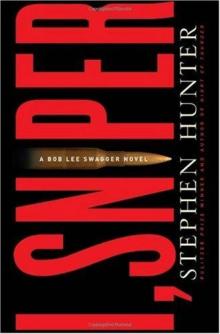 I, Sniper
I, Sniper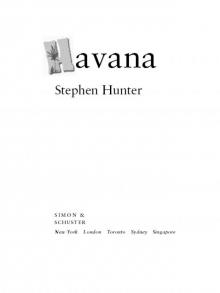 Havana
Havana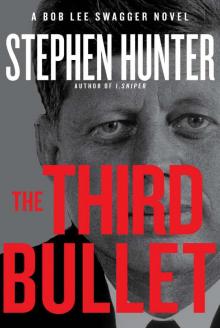 The Third Bullet
The Third Bullet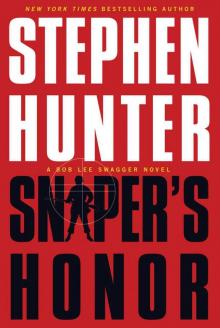 Sniper's Honor: A Bob Lee Swagger Novel
Sniper's Honor: A Bob Lee Swagger Novel Dirty White Boys
Dirty White Boys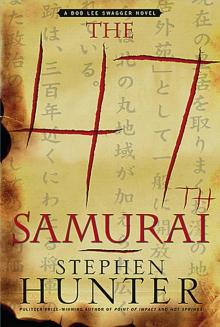 The 47th Samurai
The 47th Samurai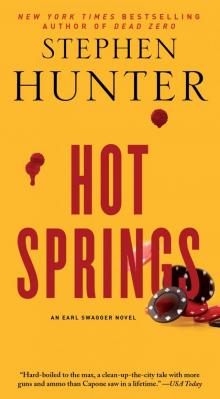 Hot Springs
Hot Springs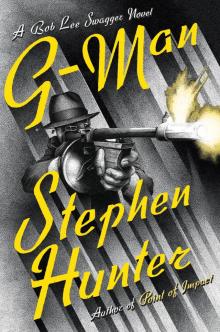 G-Man
G-Man Black Light
Black Light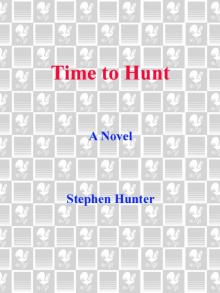 Time to Hunt
Time to Hunt The Day Before Midnight
The Day Before Midnight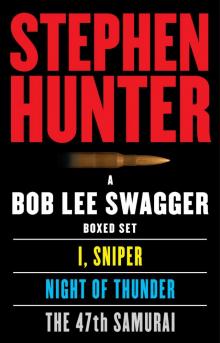 A Bob Lee Swagger Boxed Set
A Bob Lee Swagger Boxed Set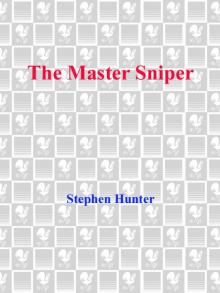 The Master Sniper
The Master Sniper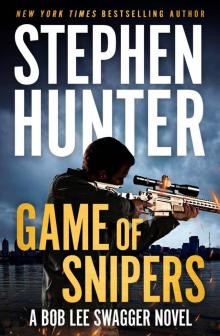 Game of Snipers
Game of Snipers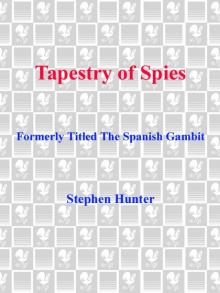 Tapestry of Spies
Tapestry of Spies Citadel
Citadel The Second Saladin
The Second Saladin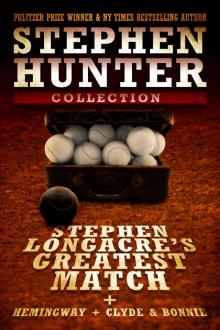 Stephen Longacre's Greatest Match
Stephen Longacre's Greatest Match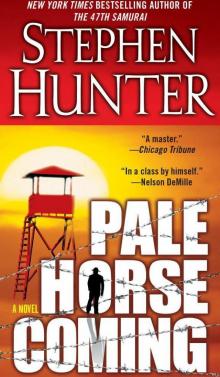 Pale Horse Coming
Pale Horse Coming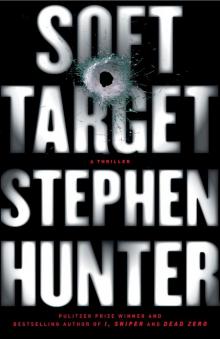 Soft Target
Soft Target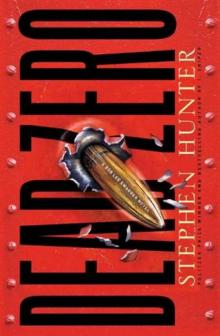 Dead Zero
Dead Zero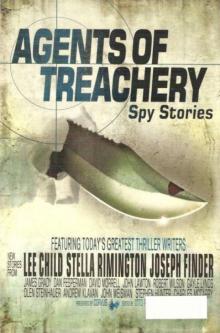 Casey at the Bat
Casey at the Bat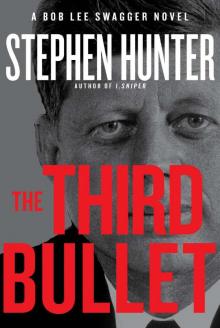 The Third Bullet bls-8
The Third Bullet bls-8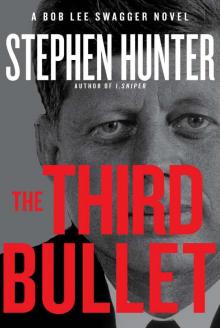 The Third Bullet: A Bob Lee Swagger Novel
The Third Bullet: A Bob Lee Swagger Novel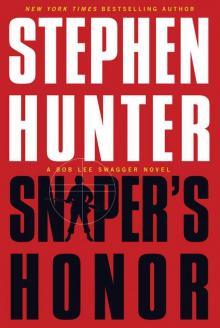 Sniper's Honor
Sniper's Honor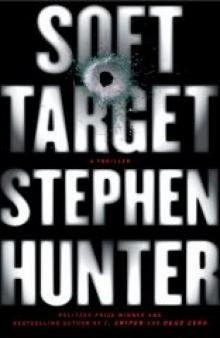 Soft target rc-1
Soft target rc-1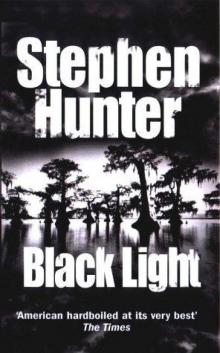 Black Light bls-2
Black Light bls-2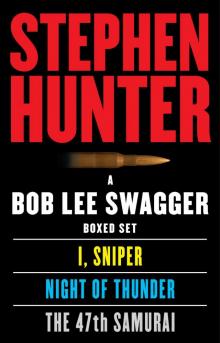 A Bob Lee Swagger eBook Boxed Set: I, Sniper, Night of Thunder, 47th Samurai
A Bob Lee Swagger eBook Boxed Set: I, Sniper, Night of Thunder, 47th Samurai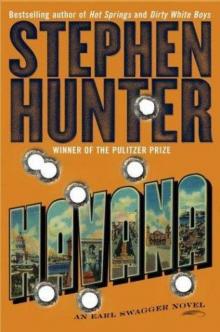 Havana es-3
Havana es-3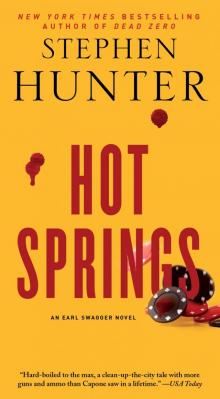 Hot Springs (Earl Swagger)
Hot Springs (Earl Swagger)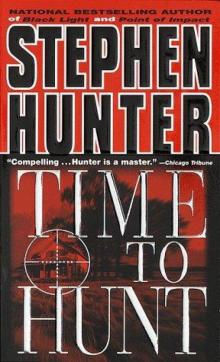 Time to Hunt bls-1
Time to Hunt bls-1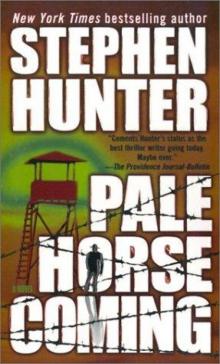 Pale Horse Coming es-2
Pale Horse Coming es-2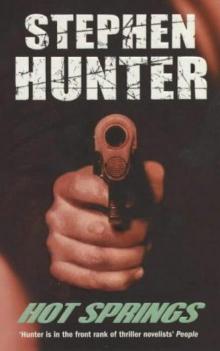 Hot Springs es-1
Hot Springs es-1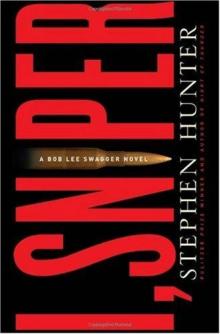 I, Sniper: A Bob Lee Swagger Novel
I, Sniper: A Bob Lee Swagger Novel